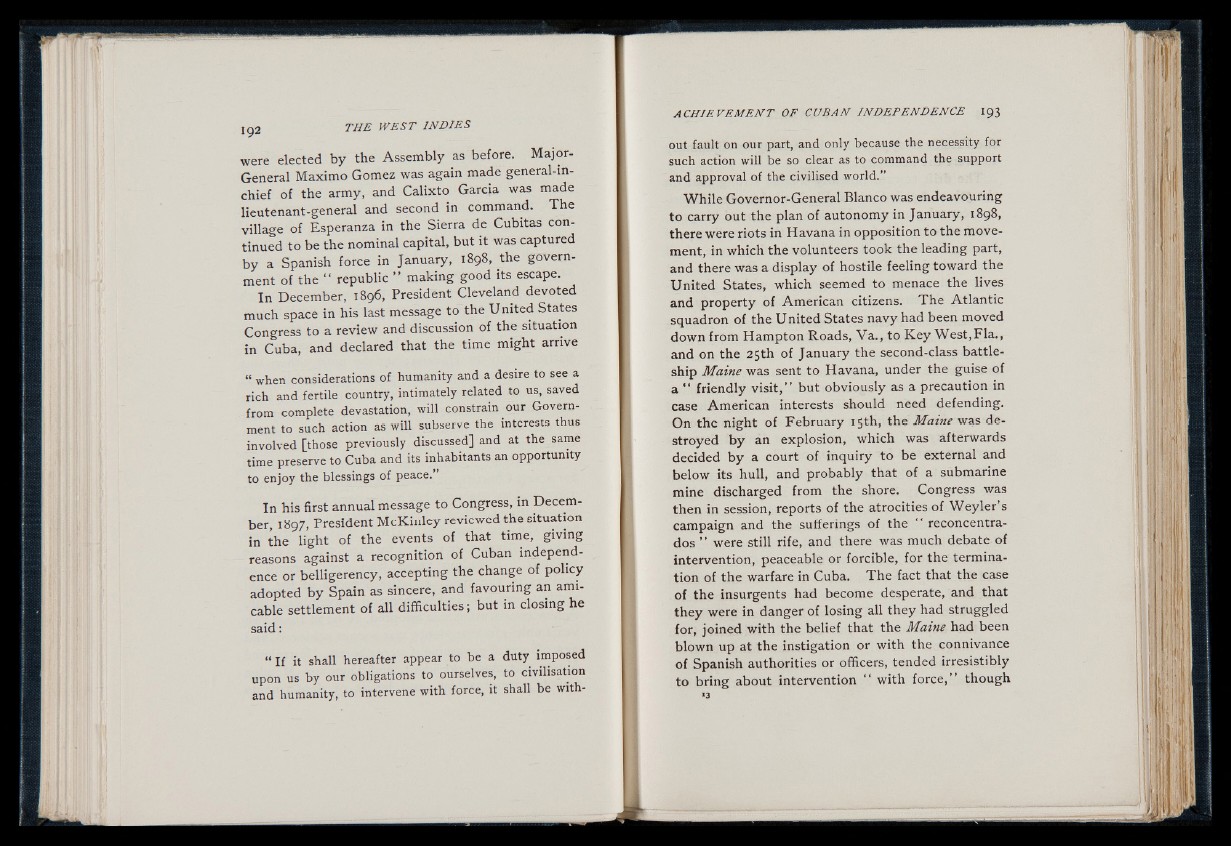
were elected by the Assembly as before. Major-
General Maximo Gomez was again made general-in-
chief of the army, and Calixto Garcia was made
lieutenant-general and second in command. T he
village of Esperanza in the Sierra de Cubitas continued
to be the nominal capital, but it was captured
b y a Spanish force in January, 1898, the government
of the " republic ” making good its escape.
In December, 1896, President Cleveland devoted
much space in his last message to the United States
Congress to a review and discussion of the situation
in Cuba, and declared that the time might arrive
“ when considerations of humanity and a desire to see a
rich and fertile country, intimately related to us, saved
from complete devastation, will constrain our Government
to such action as will subserve the interests thus
involved [those previously discussed] and at the same
time preserve to Cuba and its inhabitants an opportunity
to enjoy the blessings of peace.”
In his first annual message to Congress, in December,
1897, President McKinley reviewed the situation
in the light of the events of that time, giving
reasons against a recognition of Cuban independence
or belligerency, accepting the change of policy
adopted by Spain as sincere, and favouring an amicable
settlement of all difficulties; but in closing he
sa id :
“ If it shall hereafter appear to be a duty imposed
upon us by our obligations to ourselves, to civilisation
and humanity, to intervene with force, it shall be without
fault on our part, and only because the necessity for
such action will be so clear as to command the support
and approval of the civilised world.”
While Governor-General Blanco was endeavouring
to carry out the plan of autonomy in January, 1898,
there were riots in Havana in opposition to the movement,
in which the volunteers took the leading part,
and there was a display of hostile feeling toward the
United States, which seemed to menace the lives
and property of American citizens. T he Atlantic
squadron of the United States navy had been moved
down from Hampton Roads, V a ., to K e y W e s t,F la .,
and on the 25th of January the second-class battleship
Maine was sent to Havana, under the guise of
a “ friendly v is it,” but obviously as a precaution in
case American interests should need defending.
On the night of February 15th, the Maine was destroyed
by an explosion, which was afterwards
decided b y a court of inquiry to be external and
below its hull, and probably that of a submarine
mine discharged from the shore. Congress was
then in session, reports of the atrocities of W e y le r ’s
campaign and the sufferings of the " reconcentrados
” were still rife, and there was much debate of
intervention, peaceable or forcible, for the termination
of the warfare in Cuba. T h e fact that the case
of the insurgents had become desperate, and that
they were in danger of losing all they had struggled
for, joined with the belief that the Maine had been
blown up at the instigation or with the connivance
of Spanish authorities or officers, tended irresistibly
to bring about intervention “ with force,” though
13